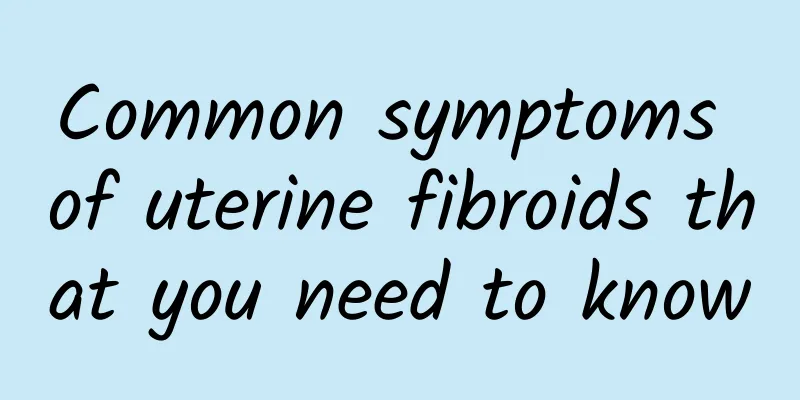Common symptoms of uterine fibroids that you need to know

|
There are always some signs in the early stages of a disease, and the same is true for uterine fibroids. In order to detect symptoms early and treat them in time, we will introduce the symptoms of uterine fibroids below. 1. Menstrual changes: When tumors grow in the uterus, such as uterine fibroids, endometrial cancer, uterine sarcoma, and choriocarcinoma, menstrual abnormalities may occur, including excessive menstrual flow, irregular menstrual cycles, prolonged menstrual duration, and spotting. Certain ovarian tumors, such as granulosa cell tumors and theca cell tumors, can secrete estrogen, interfere with the menstrual cycle, and cause menstrual abnormalities. For example, long-term excessive menstrual flow caused by fibroids can lead to secondary anemia, which in severe cases can manifest as general fatigue, pale complexion, and shortness of breath. Symptoms such as palpitations are common symptoms of uterine fibroids.2. Abdominal pain: Ovarian tumor torsion, rupture or infection, uterine submucosal fibroids prolapse from the cervix or fibroid degeneration can all cause severe lower abdominal pain. 3. Postmenopausal bleeding: In the first year of amenorrhea, vaginal bleeding may occur occasionally. If vaginal bleeding occurs again after more than one year of amenorrhea, it is called postmenopausal bleeding. There are many reasons for postmenopausal bleeding. In most cases, it is caused by benign diseases, but the possibility of cervical cancer and endometrial cancer cannot be ignored. Although the amount of bleeding is sometimes not much, this is also one of the symptoms of uterine fibroids. 4. Tumors: They can grow in any part of the reproductive organs. They are usually discovered by accident. Even if these tumors do not have any symptoms, they are abnormal and are mostly tumors. 5. Changes in diet and urination: The symptoms of uterine fibroids may only include abdominal distension, poor appetite and gastrointestinal symptoms. Tumor compression or invasion of the bladder and rectum can cause frequent urination, difficulty urinating, dry stools, etc. I hope that the above five aspects of the introduction to the symptoms of uterine fibroids will be helpful to everyone. Once any of the above symptoms appear, go to the hospital for examination and diagnosis in time to avoid delaying the disease and affecting treatment. I hope everyone can maintain a healthy body. |
<<: What you need to know about the causes of uterine fibroids
>>: Key points to know about postoperative care for uterine fibroids
Recommend
What are the symptoms of uterine fibroid contraction? What are the reactions to uterine fibroid contraction?
What are the symptoms of uterine fibroid contract...
What are the symptoms of adenomyosis in 20-year-olds?
What are the symptoms of adenomyosis in a 20-year...
Does mild cervical adhesion need to be treated?
Whether or not minor cervical adhesions need to b...
What are the harms of dysmenorrhea
Dysmenorrhea is a common gynecological disease, a...
How to treat chronic cervicitis with squamous epithelial hyperplasia? 3 methods are the most effective in treating chronic cervicitis
Some diseases are chronic, and some are short-ter...
Don't forget low GI foods when losing weight. Rehydrating your body with water will have a better effect.
Pay attention to the GI index when eating lunch T...
When is the ovulation period if the menstruation comes on the 30th?
A while ago, my best friend and I went to the hos...
Can an ectopic pregnancy test paper detect it?
Ectopic pregnancy refers to a pregnancy in which ...
Can abnormal leucorrhea be treated?
Abnormal vaginal discharge can usually be treated...
A brief discussion on the treatment of irregular menstruation
Menstrual irregularities include changes in the c...
What are the symptoms of spontaneous abortion?
Spontaneous abortion may cause symptoms such as v...
Low back pain may indicate adnexitis
Adnexitis mainly refers to the inflammation of th...
Hospitalization costs for late threatened abortion
It is not easy to make money now, but when you go...
What to do if uterine fibroids appear before pregnancy? How to treat uterine fibroids before pregnancy?
Although uterine fibroids are benign tumors that ...
Experts introduce you to six tips for treating dysmenorrhea
Many female friends have experienced the torture ...









